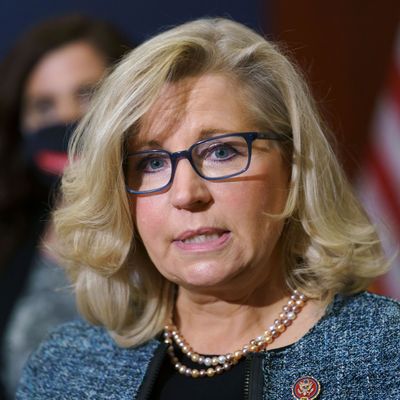
Liz Cheney’s apparently imminent defenestration from House Republican leadership has spawned a genre of liberal commentary that could be summarized as “Liz Cheney Was No Angel.” Yes, these columns concede, Cheney might be finally doing one good deed, but her career consists of a long string of misdeeds that matter far more. “Liberals responded to Trump’s derangements by bathing the Bush-Cheney crowd in a flattering nostalgic light,” writes Maureen Dowd, “So, shockingly, the Republicans who eroded America’s moral authority — selling us the Iraq war, torture, a prolonged Afghanistan occupation and Sarah Palin — became the new guardians of America’s moral authority. Complete with bloated TV and book contracts.” Other examples of the genre can be found here, here, and here.
I certainly wouldn’t vote for Cheney as the guardian of America’s moral authority — or for any other public office, for that matter. I agree that she has spent her career advocating ideas and policies I find misguided, immoral, and sometimes completely deranged. And yet this round of liberal complaints misses the profound significance of her current stand.
In some sense, the entire Republican Party is complicit in Donald Trump’s assault on democracy. The party’s turn against democracy has unfolded over decades and has its philosophical roots in the conservative movement’s belief that majority rule is a danger to property rights. All the Republicans helped nurture a right-wing misinformation bubble that would permit their voters to disregard any sources of news not working within the party and the conservative movement; all of them promoted in some form a deep paranoia about the slippery slope toward socialism created by even the most moderate Democratic Party policies.
But Cheney’s break with her party is not just one issue, to be weighed on the ledger alongside all the others. It’s a question of singular importance.
The Republican Party’s democracy skepticism is crossing a dangerous new threshold, and is now making routine the practice of rejecting any election loss. Trump’s autogolpe matters because the party is internalizing his belief that Democratic election victories are not just inherently fraudulent, but can and should be challenged and overturned. The Republicans who broke with Trump are being punished and in some cases removed from their positions, and those who stood behind him rewarded. Republicans were too divided to carry through Trump’s attempt to reject the election, but next time, the party will be far more united.
Cheney’s decision to challenge the party on democracy is remarkable for several reasons. First, she is putting the issue squarely. Rather than softening her line or couching her stance in the logic of messaging (i.e., Trump’s rhetoric will hurt Republicans with swing voters), she is straightforwardly instructing her fellow Republicans that their current path is a menace to the Constitution and the rule of law. Second, she has absolutely nothing to gain and a great deal to lose.
And third, the fact she is such a dogmatic right-winger on economic, social, and foreign policy gives her support for democracy more, not less, weight. The very point of her dissent is that support for democracy ought to be separated from policy outcomes. Republicans should not succumb to the temptation of siding with a would-be authoritarian merely because he promises to advance their policy goals. “He’ll undermine the Constitution, but give us low capital gains taxes and friendly judges” is not a morally defensible trade-off. Democracy is the one question not subject to horse-trading.
When Cheney’s liberal critics place her support for democracy alongside her other positions, they implicitly endorse the same calculation made by her conservative opponents: that the rule of law is just another issue.
The only way democracy survives is if both sides respect the outcome of a free and fair election as a precondition to all their other disagreements. Democracy is a system for maintaining domestic peace. You make peace with your enemies, not your friends.






























